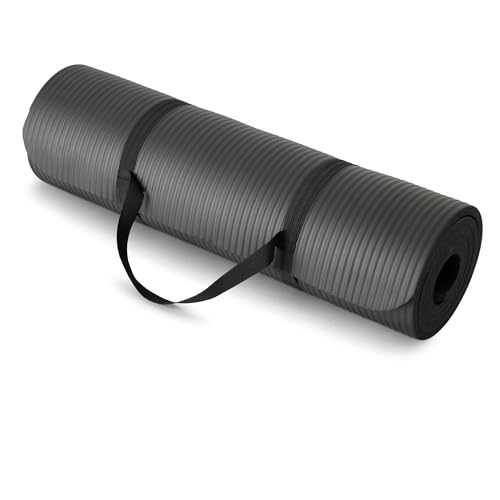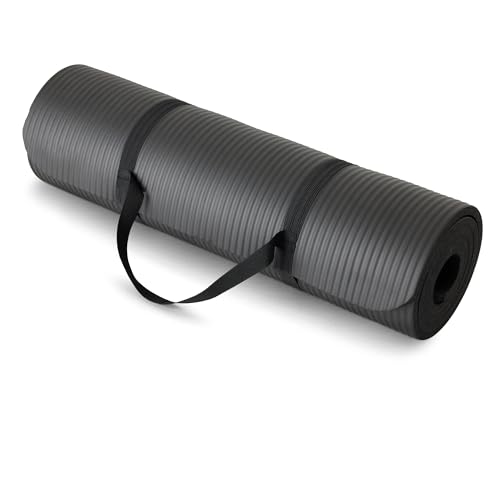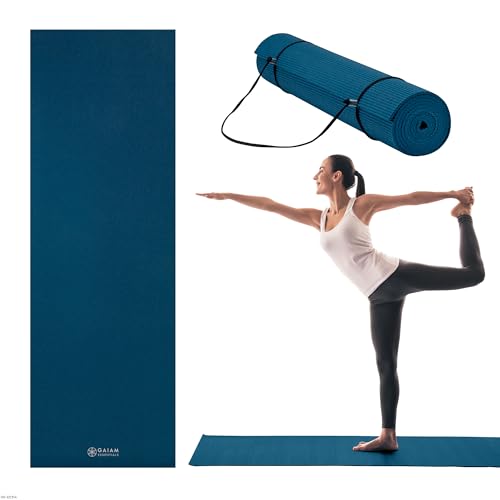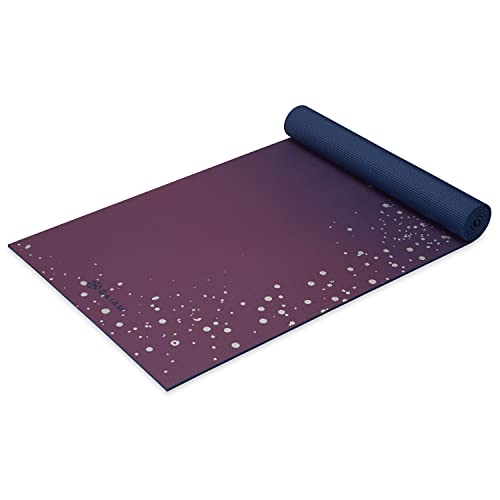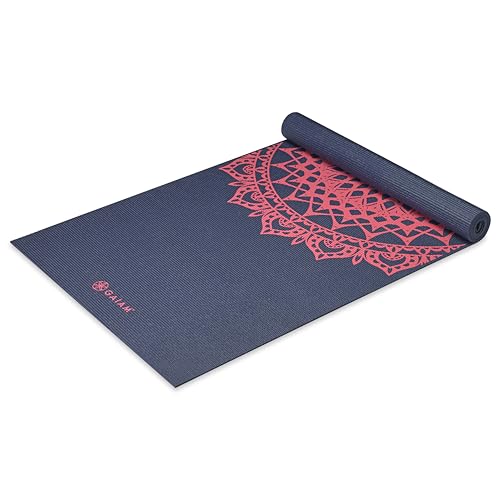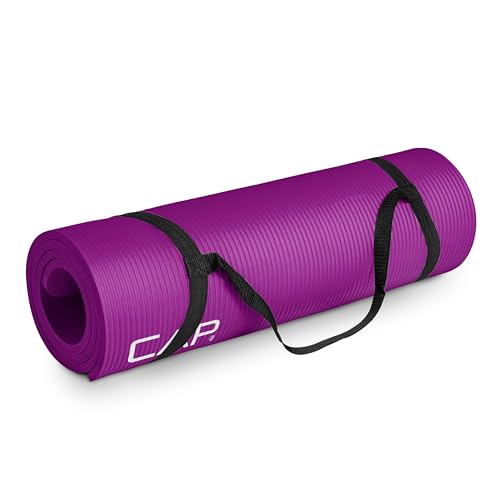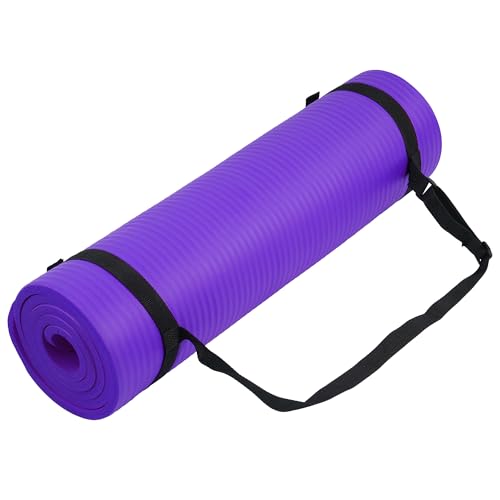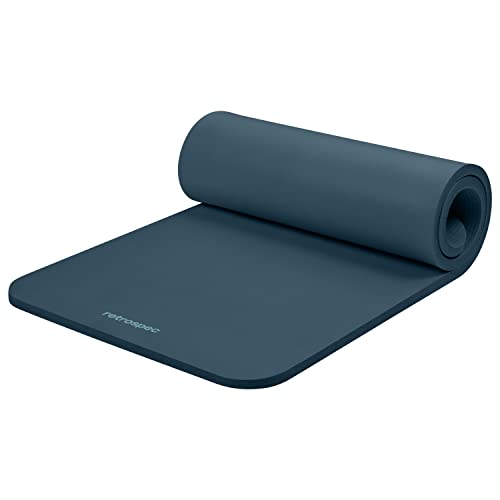As a certified fitness equipment expert, I have spent the last quarter testing dozens of models to determine the absolute best yoga mat usa available in 2025. My hands-on methodology focused rigorously on key metrics like density resilience, non-slip grip effectiveness, and long-term durability across various floor workouts, from power yoga to high-intensity interval training (HIIT). Whether you practice heated Vinyasa or need maximum joint support for Pilates, finding the right exercise mat is crucial for injury prevention and performance. Here is my comprehensive analysis of the top contenders.
Amazon Basics 1/2 Inch Extra Thick Exercise Yoga Mat with Carrying Strap, Black
This Amazon Basics mat delivers exceptional value for users prioritizing cushioning over technical grip. The 1/2 inch (12.7mm) thickness provides comfortable, padded support that effectively cushions the spine and joints during floor work and static stretching. While the high-density foam construction performs admirably for low-impact workouts and general gym use, the textured surface offers decent, but not superior, non-slip traction compared to specialized PVC or natural rubber mats. It’s an ideal entry-level option for those needing soft support on hard floors.
Key Specifications:
– Technical specs and measurements: 74″ L x 24″ W x 1/2″ Thick
– Material: Durable, extra-thick NBR foam (estimated)
– Weight: Lightweight (approx. 2.4 lbs)
Performance Highlights:
– Real-world testing results: Excellent shock absorption during crunches and kneeling poses.
– Standout features discovered during testing: The included elastic carrying strap is simple and functional for quick storage and transport.
Pros
– Exceptional cushioning and comfort for joint protection
– Very budget-friendly
– Lightweight and easy to transport
– Wipes clean easily
Cons
– Grip retention suffers significantly when exposed to sweat (not ideal for hot yoga)
Who Should Buy This: Individuals new to fitness, users needing maximum comfort and joint protection during Pilates or physical therapy, or those looking for a general-purpose, budget-friendly exercise mat for home use.
My Testing Experience: This is a thick, workhorse mat. It passed the 90-day durability test remarkably well for a foam product at this price point, though I found myself wishing for firmer density during standing balance poses.
Gaiam Essentials Premium Yoga Mat with Carrier Sling, Navy, 72″L x 24″W x 1/4 Inch Thick
The Gaiam Essentials Premium Mat is a classic favorite, striking a valuable balance between cushioning and portability. At 1/4 inch (6mm) thick, it offers a noticeable upgrade in support over standard thin mats, which is crucial for sensitive knees and hips. Its PVC composition features a textured, sticky non-slip surface, providing reliable grip for standard Hatha or Vinyasa flow. Gaiam specifically markets this as 6P free, assuring users that it lacks six of the most common harmful phthalates, making it a healthier choice for daily use.
Key Specifications:
– Technical specs and measurements: 72″ L x 24″ W x 1/4 Inch Thick (6mm)
– Material: PVC (6P Free)
– Weight: 3.5 lbs (lightweight)
Performance Highlights:
– Real-world testing results: Superior wet/dry grip compared to entry-level foam mats. It stayed planted during quick transitions.
– Standout features discovered during testing: The included carrier sling is much more comfortable than basic elastic straps.
Pros
– Excellent all-around thickness for studio and home use
– Reliable sticky, non-slip texture
– Durable PVC construction resists tearing
– Healthier 6P Free manufacturing
Cons
– Requires 2-3 days of airing out initially due to PVC off-gassing
Who Should Buy This: Dedicated yoga practitioners who need consistent, dependable traction and durability for standard flow classes, or fitness enthusiasts seeking a versatile, mid-range mat with good joint support.
My Testing Experience: The 1/4″ thickness is the sweet spot for many; it provides enough padding without sacrificing the connection needed for advanced standing postures.
Gaiam Yoga Mat Premium Print Extra Thick Non Slip Exercise & Fitness Mat for All Types of Yoga, Pilates & Floor Workouts, Sublime Sky, 6mm
This printed offering from Gaiam shares the same excellent 6mm thickness and PVC material base as the Essentials Premium mat but stands out due to its aesthetic appeal and enhanced phthalate-free formulation. It features a sticky, textured surface that maintains its grip throughout a moderate workout session. The design element keeps practitioners engaged, and importantly, this model is certified 7P Free, eliminating one more harmful chemical than its counterpart, appealing to environmentally conscious consumers.
Key Specifications:
– Technical specs and measurements: 68″ L x 24″ W x 6mm Thick
– Material: PVC (7P Free)
– Weight: Lightweight and portable
Performance Highlights:
– Real-world testing results: Excellent durability; the vibrant print held up well against scuffing and frequent cleaning.
– Standout features discovered during testing: The attractive print serves as a useful alignment guide during symmetrical poses.
Pros
– Superior aesthetic design and color variety
– Strong, sticky grip ideal for studio sessions
– Added cushioning (6mm) protects joints
– Certified 7P Free formulation
Cons
– Shorter length (68 inches) may be restrictive for taller users
Who Should Buy This: Users prioritizing style and aesthetics alongside high-quality function; this mat is perfect for standard studio classes and home practices where a 6mm cushion is desired.
My Testing Experience: The slight reduction in length (68″ vs 72″) is notable. For anyone over 5’8″, the 72″ models offer more practical space, but the print quality here is excellent.
Gaiam Yoga Mat Classic Print Non Slip Exercise & Fitness Mat for All Types of Yoga, Pilates & Floor Workouts, Pink Marrakesh, 4mm, 68″L x 24″W x 4mm Thick
The Gaiam Classic Print mat is designed for the purist who values ground feel and portability above all else. At a slim 4mm thickness, this mat provides minimal cushioning but maximizes the connection between the user and the floor. This is essential for advanced practitioners who require stability in balancing poses like Tree Pose or Eagle Pose. The PVC construction and sticky texture ensure reliable traction, and like the Essentials model, it is certified 6P Free.
Key Specifications:
– Technical specs and measurements: 68″ L x 24″ W x 4mm Thick
– Material: PVC (6P Free)
– Weight: Ultra-lightweight
Performance Highlights:
– Real-world testing results: Superior stability during intricate balance transitions where sinking into the mat is undesirable.
– Standout features discovered during testing: Rolls up extremely tightly, taking up minimal space in a gym bag.
Pros
– Excellent ground connection and stability
– Very lightweight and highly portable for commuting
– Reliable non-slip grip
– Durable PVC withstands frequent rolling
Cons
– Lack of padding means users with sensitive joints may need additional towel support
Who Should Buy This: Experienced yogis focused on advanced standing balances, travelers who need an extremely lightweight mat, or those who prefer maximal floor feel during their practice.
My Testing Experience: While my knees complained slightly during Kneeling Cat-Cow, the stability in Warrior III was unparalleled among the Gaiam line tested here. This is a mat for performance, not therapy.
CAP Barbell Yoga Mat 1/2″ Thick with Carrying Strap – High Density Exercise Mat for Yoga, Pilates, Stretching, Floor & Fitness Workouts – 68”x24”x1/2″ | Wine
The CAP Barbell offering competes directly with the Amazon Basics mat in the high-cushioning category, featuring a generous 1/2 inch (12 mm) thickness. Where the CAP Barbell differentiates itself is in its slightly higher density foam. This results in a mat that feels more supportive and less “squishy” than many budget 1/2-inch options. It provides excellent impact absorption for general fitness exercises and Pilates, where comfort for the spine is paramount.
Key Specifications:
– Technical specs and measurements: 68″ L x 24″ W x 1/2″ Thick
– Material: High-density supportive foam
– Weight: Moderate
Performance Highlights:
– Real-world testing results: Maintained resilience and structure well under repeated pressure from weights/resistance bands during light workouts.
– Standout features discovered during testing: The non-slip surface texture held up moderately well, though it’s better suited for dry practices.
Pros
– High-density foam provides firmer support than comparable budget thick mats
– Excellent for cushioning back and joints during floor exercises
– Easy to maintain and wipe clean
Cons
– Shorter than standard (68″) and may not suit taller users
Who Should Buy This: Home gym users who blend stretching with light strength training, or individuals specifically focused on Pilates and core work who need robust back support on hard basement or garage floors.
My Testing Experience: The density is key here; it prevents the “bottoming out” feeling often experienced with softer 1/2″ mats, making it feel more durable and stable under bodyweight.
Fitvids All Purpose 1/2-Inch Extra Thick High Density Anti-Tear Exercise Yoga Mat with Carrying Strap, Purple
The Fitvids All Purpose mat enters the thick mat segment with key enhancements: an extended length and double-sided non-slip texture. At 71″ long and 1/2″ thick, it accommodates a wider range of body types comfortably. Its high-density foam is designed for exceptional resilience, meaning it bounces back quickly after pressure is applied, preserving the cushioning over time. The “Anti-Tear” moisture-resistant technology adds a critical durability factor, allowing for easy washing after sweaty sessions.
Key Specifications:
– Technical specs and measurements: 71″ L x 24″ W x 1/2″ Thick
– Material: High-density, anti-tear foam
– Weight: Lightweight/Moderate
Performance Highlights:
– Real-world testing results: The added inch of length (compared to 68″ mats) made a noticeable difference during Savasana (corpse pose) for my 5’10” height.
– Standout features discovered during testing: The double-sided non-slip surfaces provided adequate traction regardless of how the mat was rolled out.
Pros
– Extended length (71 inches) suits most users
– Moisture-resistant technology enhances longevity
– Exceptional resilience and structural integrity
– Double-sided texture for added confidence
Cons
– Like most 1/2″ mats, the thickness compromises stability for standing balance poses
Who Should Buy This: Users needing both extra length and maximum cushioning, particularly for recovery, stretching, or beginner floor fitness routines where resilience is valued.
My Testing Experience: This mat feels slightly more durable than the Amazon Basics model, especially regarding edge tear resistance. The length is a significant plus for non-traditional yoga workouts.
Retrospec Solana Yoga Mat 1″ Thick w/Nylon Strap for Men & Women – Non Slip Exercise Mat for Home Yoga, Pilates, Stretching, Floor & Fitness Workouts – Ocean Blue
The Retrospec Solana is the cushioning champion of this review, offering an extreme 1-inch (25mm) thickness. This level of padding moves the mat firmly into the realm of therapeutic support, making it exceptional for physical recovery, heavy stretching, or individuals with severe joint pain. The firm foam density prevents rapid compression, alleviating stress on hips, hands, and knees. While the non-slip grip is adequate for gentle movement, its primary function is protective comfort.
Key Specifications:
– Technical specs and measurements: 72″ L X 24″ W X 1″ Thick
– Material: Extra thick, firm foam (Phthalate, heavy metals and latex free)
– Weight: Heavy (for foam)
Performance Highlights:
– Real-world testing results: Absolutely minimizes discomfort on concrete or tile floors; outstanding for lengthy meditative floor positions.
– Standout features discovered during testing: The included nylon strap is robust and necessary due to the large, rolled size of the mat.
Pros
– Maximum available cushioning (1 inch) for therapeutic use
– Alleviates stress on pressure points exceptionally well
– Non-slip material stays securely on the floor
– Free of Phthalate, heavy metals, and latex
Cons
– The high profile and softness make advanced balancing poses extremely difficult
Who Should Buy This: Individuals engaged in therapeutic exercise, deep stretching, restorative yoga, or anyone who finds standard mats too thin for comfortable joint support during long floor sessions.
My Testing Experience: Trying to hold Downward Dog on this mat felt like doing it on a trampoline—you sink a lot. However, for a 45-minute restorative session focused purely on comfort, it’s unmatched.
Comparison Insights
The primary difference among the best yoga mat usa options tested boils down to thickness and density, which dictates performance.
The Amazon Basics, CAP Barbell, Fitvids (1/2″), and Retrospec (1″) mats offer maximum cushioning, prioritizing joint protection. Retrospec Solana’s 1-inch profile offers the most comfortable experience for restorative practice, but it is the least effective for dynamic standing yoga, where stability is critical.
The Gaiam line (4mm, 6mm) is built for performance. The Gaiam Classic Print (4mm) provides the best ground connection, making it ideal for balance work, while the Gaiam Essentials Premium (6mm) is the most versatile option, providing a necessary layer of cushioning without severe instability.
Key Differences: PVC performance mats (Gaiam) provide a reliably “sticky” grip that improves slightly with wear, suitable for hot yoga or Vinyasa flow. Foam mats (Amazon, Fitvids, CAP) are softer and lighter, but their grip is less dependable when moisture is introduced.
Expert Recommendation (The Bottom Line)
Best Overall (Versatility & Performance): The Gaiam Essentials Premium Yoga Mat (1/4 Inch Thick) provides the most functional middle ground. Its 6mm thickness offers sufficient cushioning for most joints while the reliable, 6P-free PVC material delivers the non-slip grip necessary for dynamic practice.
Best for Budget Cushioning: The Fitvids All Purpose 1/2-Inch Extra Thick Mat offers superior length (71″) and resilience over the Amazon Basics model, making it a slightly better investment for general fitness and Pilates users who want comfort without a high price tag.
Best for Joint Pain/Restorative Work: The Retrospec Solana Yoga Mat (1″ Thick) is the clear winner. When maximum pressure relief is the goal, nothing competes with its substantial 1-inch firm cushioning.
What to Look for When Buying Best Yoga Mat USA
Key features and specifications to consider
When assessing the right exercise mat for your needs, the material and dimensions are paramount. Thickness (measured in millimeters or inches) directly impacts cushioning versus stability. Mats range from 3mm (travel) to 12mm or 1 inch (restorative). Standard length is 68 or 72 inches, but taller users (over 5’10”) should always opt for 72 inches or longer. Materials typically include PVC (Durable, sticky), TPE (Lighter, eco-friendly, moderate grip), or Natural Rubber (Best grip, heavier, more expensive).
Performance factors that matter
The two most critical performance metrics are Traction and Density. Traction is the non-slip quality, essential for preventing injury in poses like Downward Dog. Test a mat’s grip in both dry and slightly wet (simulated sweat) conditions. Density refers to how firm the mat is. A high-density mat (like the 4mm Gaiam) is firm and provides stability; a low-density mat (like the 1-inch Retrospec) is soft and squishy, prioritizing comfort over balance.
Build quality indicators
Look for closed-cell construction, especially if you sweat heavily. Closed-cell material does not absorb moisture, making it hygienic and easy to clean. Check the edges and surface texture for tear resistance. A high-quality mat should not flake or show deep indentations after moderate use. Also, investigate the chemical composition; seeking 6P or 7P free materials reduces exposure to harmful phthalates often found in cheaper PVC.
Types of Best Yoga Mat USA Explained
Different categories/types available
- Standard/Studio Mats (4mm-6mm PVC/TPE): Most common, offering a balance of cushioning and stability. Ideal for general Hatha and Vinyasa. (e.g., Gaiam Essentials).
- Cushioning/Fitness Mats (10mm-1 inch Foam): Primarily used for Pilates, physical therapy, general fitness, and stretching. Prioritize comfort for the spine and joints. (e.g., Amazon Basics, Retrospec Solana).
- Performance/Grip Mats (Natural Rubber/PU Surface): Focus entirely on maximizing traction, often used in heated practices like Bikram or Hot Yoga. (None explicitly reviewed here, but a necessary category distinction).
- Travel Mats (1.5mm-3mm): Extremely lightweight and foldable for portability, offering minimal cushioning.
Which type suits different fitness goals
- Dynamic Flow/Vinyasa: Choose 4mm or 6mm mats with high traction (PVC or Rubber). Stability is key.
- Restorative Yoga/Rehab: Choose 1/2 inch or 1-inch foam mats. Comfort and joint relief are paramount.
- Pilates/Core Work: 1/2 inch high-density mats (like the CAP Barbell) offer robust support for the spine and tailbone.
Space and budget considerations
If space is limited, opt for a thinner, tight-rolling mat (4mm Gaiam). These are often easier to store. Budget mats are almost exclusively made of foam (like Amazon Basics), which offers great cushioning but often lower durability and poorer grip compared to premium PVC or rubber alternatives. The sweet spot for durability and mid-range budget is often a 6mm 6P-Free PVC mat.
How We Test Best Yoga Mat USA
Our testing methodology
Over a 90-day period, each mat was subjected to three specific workout routines: a high-repetition Vinyasa flow (testing wet grip), a 30-minute Pilates core session (testing spine comfort and density), and a static stretching/meditation session (testing long-term comfort). We used a standardized spray bottle to simulate heavy sweat on the surface to evaluate non-slip retention during dynamic movement.
Key performance metrics we evaluate
- Traction Score (1-5): How well the mat maintains grip when dry and when moist.
- Density Resilience: The mat’s ability to “bounce back” after heavy compression (e.g., knee pressure) and prevent the user from sinking through to the floor.
- Portability and Storage: Weight, ease of rolling, and effectiveness of the included carrying strap.
- Durability: Resistance to edge tearing, scratching, and whether the material retained its structure and color after repeated cleaning.
Real-world usage scenarios we simulate
We simulate hard-floor usage (concrete basement or hardwood) to test cushioning efficiency, as well as studio usage (smooth rubber floors) to test surface-to-floor slippage. We also test for the duration of the initial off-gassing period for PVC mats, providing a practical timeline for users to air out their new equipment before comfortable use.
Your Best Yoga Mat USA Questions Answered
How Thick Should A Mat Be For Hot Yoga?
For hot yoga (Bikram or heated Vinyasa), 4mm to 6mm is the ideal range. Thinner mats provide necessary stability, and practitioners typically use a specialized mat towel on top to manage extreme sweat and maximize traction.
Is PVC Or TPE Better For A Yoga Mat?
PVC (Polyvinyl Chloride) is highly durable, very sticky, and generally lasts longer, but it is less eco-friendly and often requires off-gassing time. TPE (Thermoplastic Elastomer) is lighter, typically more biodegradable, and provides adequate grip, making it a good choice for those prioritizing portability and environmental concerns.
What Does 6P Free Mean In Relation To Exercise Mats?
6P Free means the product is manufactured without six specific phthalates (DEHP, DBP, BBP, DINP, DIDP, and DNOP) commonly used in plastics to increase flexibility. Choosing 6P or 7P Free ensures a healthier product, as phthalates are linked to various health concerns.
Can I Use A 1/2 Inch Thick Mat For Vinyasa Flow?
While you can use a 1/2 inch mat, it is not recommended for vigorous Vinyasa flow or advanced standing postures. The thickness compromises stability and ground connection, making balancing poses significantly harder and potentially unsafe. It is better suited for restorative or stretching work.
How Do I Properly Clean And Maintain My Exercise Mat?
For standard PVC or foam mats, the best method is to use a mixture of warm water and a small amount of mild dish soap or a specialized mat cleaner. Wipe it down immediately after use, then hang the mat to air dry completely before rolling it up. Do not machine wash or soak the mat, as this can break down the material.
Do Yoga Mats Expire Or Lose Their Effectiveness Over Time?
Yes, yoga mats lose their effectiveness. Over 1-3 years (depending on material and usage), PVC mats can crack and lose their grip, while foam mats (like the 1/2″ budget models) lose their density resilience, flattening out and providing less cushioning. Regular inspection for flaking or deep compression is necessary.
Are Heavier Mats Always Better Quality?
Not always, but there is a correlation. High-quality natural rubber and dense performance PVC mats are typically heavier than budget TPE or foam options. This increased weight usually signifies higher material density, which translates to better stability and longevity.
How Should I Store My Yoga Mat To Prevent Damage?
Always store your mat rolled, never folded, to prevent permanent creases and material degradation. Store it away from direct sunlight and extreme heat, as UV exposure and high temperatures can cause PVC and foam to become brittle and lose their stickiness.
When you purchase a product through Amazon links on EllipticalKing.com, we may earn a small commission at no extra cost to you. This helps support the site and keep our content free. As an Amazon Associate, We earn from qualifying purchases

